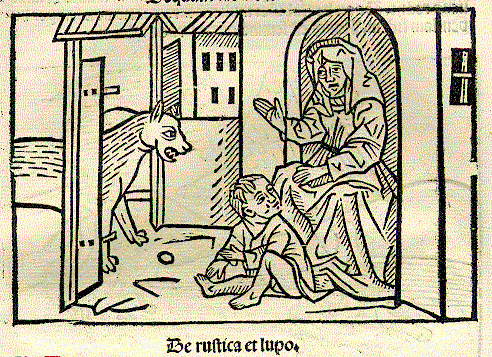This fable enters the Latin tradition through Avianus, not through Phaedrus, so you will not find many Latin examples prior to the Renaissance, when the Greek fables began to be translated into Latin. As a sample of the fable in Latin, I've chosen a version from an 18th-century schoolbook prepared for the boys of Eton (the book contains the fables in both Greek and Latin). Here is that Latin version of today's story, Lupus et Vetula:
Lupus esuriens circuibat, quaerens cibum. Profectus autem ad locum quendam, audivit puerulum lugentem, et anum dicentem ei: Desine plorare; sin minus, hac hora tradam te Lupo. Ratus igitur Lupus quod serios loquitur anicula, stetit multam expectans horam. Sed cum oppressisset vespera, audit rursus anum blandientem puerulo ac dicentem ei: Si venerit Lupus huc, interficiemus, O fili, eum. His auditis, Lupus abivit, dicens: In hoc tugurio aliud dicunt, aliud vero faciunt. Affabulatio. Fabula in homines, qui facta verbis non habent similia.
For easier reading, here is a segmented version:
Lupus esuriens
circuibat,
quaerens cibum.
Profectus autem
ad locum quendam,
audivit puerulum lugentem,
et anum dicentem ei:
Desine plorare;
sin minus,
hac hora tradam te Lupo.
Ratus igitur Lupus
quod serios loquitur anicula,
stetit
multam expectans horam.
Sed cum oppressisset vespera,
audit rursus anum
blandientem puerulo
ac dicentem ei:
Si venerit Lupus huc,
interficiemus, O fili, eum.
His auditis,
Lupus abivit,
dicens:
In hoc tugurio
aliud dicunt,
aliud vero faciunt.
Affabulatio.
Fabula in homines,
qui
facta verbis non habent similia.
I especially like the balance in this story between the old woman's harsh words to the boy at first, and then the soothing words, about how they are going to kill that nasty old wolf! In many versions of the story, the moral is explicitly misogynistic, about how it is women who cannot be trusted. This fable neatly avoids that trap, and draws a more general moral about hypocrites of either gender!
For an illustration, here is an image from Steinhowel's Aesop:

For more information about subscribing to this blog via RSS or by email, visit the Bestiaria Latina blog using the link provided here.
No comments:
Post a Comment